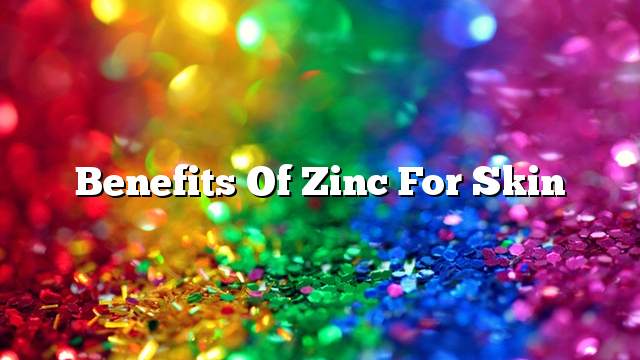Zinc
Is an important and rare metal element of the first series of transition metals, which is needed by the body but in very small amounts does not exceed fifteen milligrams per day, and must not exceed forty milligrams, and is of great importance in maintaining the processes that occur within the human body, It will be used in many foods and foods. In the article, we will learn more about the zinc element, where we will discuss the most important benefits for the body and the skin in particular, and we will recognize the foods rich in zinc.
Benefits of zinc for skin
Zinc works on the speed of regeneration of skin cells and thus protects against the appearance of acne and reduces the secretion of excess oils within the cells of the skin, and protects against the emergence of some skin problems such as rash and allergies and treats quickly, and protects against harmful sunlight, Zinc oxide, and therefore protects against skin cancer. In addition, zinc is considered anti-inflammatory. It calms the skin, especially sunburn and insect bite. It reduces the hormonal effects on the skin and regulates the activity of the sebaceous glands. Must be skin.
Benefits of zinc to the body
- Maintains the level of blood sugar and prevents its height, and also stabilizes metabolic rates in the body.
- Protects your body from weak immunity, helps heal wounds and burns as it acts as a soothing and gentle and treats acne.
- Maintains the sense of smell and taste, and is considered necessary in the production of proteins and nucleic acids.
- It is important for the development of the genitals and is essential for the functioning of the prostate gland.
- Moisturizes the skin and treats periodontal diseases, nourishes and prevents hair loss, and introduces in the preparation of some types of shampoo for the treatment of dandruff.
- Protects against congenital malformation and enlarged birth, which is essential in the growth of children and maintenance of bone growth.
- Maintains the number of white blood cells. Zinc also plays a large role in fertility in men. It protects the prostate gland from inflation and keeps sperm count and normal movement.
- Regulates metabolism in the body.
Zinc sources
- Spinach.
- Chicken turkey.
- Yogurt.
- Oats.
- Beef and lamb.
- Whole grains.
- Seeds of pumpkin
- Oysters.
- Eggs and pistachios.
- Wheat germ.
- Fish and seafood in general.
- Peanuts, black chocolate and cocoa.
- Wheat flour, beans and pulses in general.
